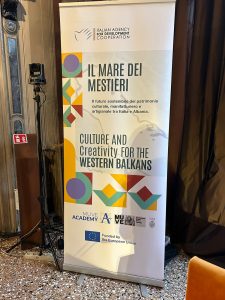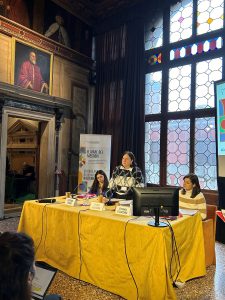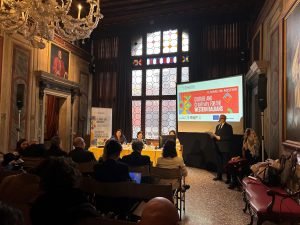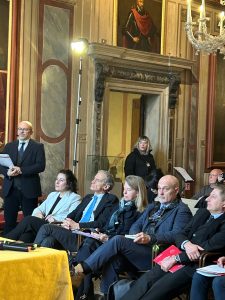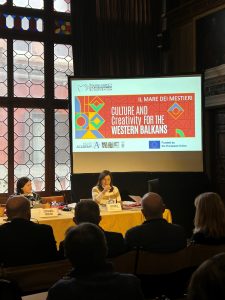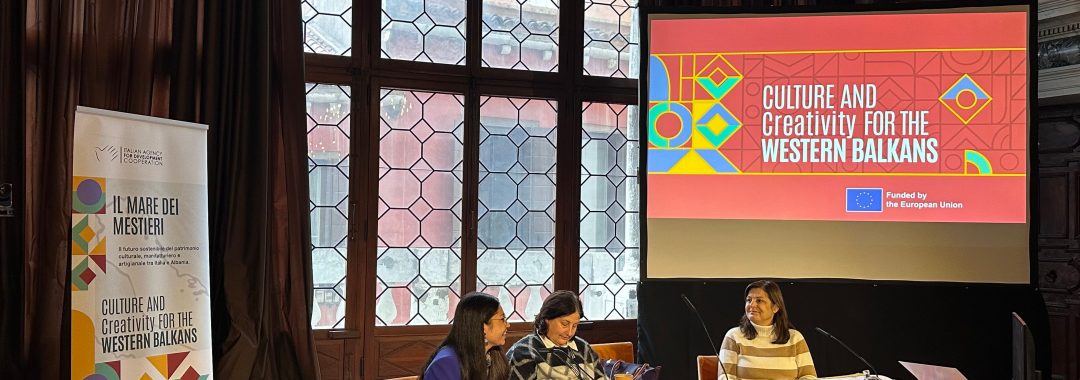On 15 January 2024, the workshop “Il Mare dei Mestieri” took place at Palazzo Mocenigo, in Venice (Italy), hosted by the Fondazione Musei Civici di Venezia. This event, funded by the European Union within the framework of the “Culture and Creativity for the Western Balkans” (CC4WBs) Project, was organized by the Institute of Rural Research, Albania, and funded through the Italian Agency for Development for Cooperation in Tirana.
The primary objective of the workshop was to establish connections between specific traditional manufacturing craftmanship and the exploration of new cultural models for boosting skills and creativity. A pivotal focus was placed on the introduction of the Xhubleta, a 4,000-year-old traditional Albanian garment inscribed on the UNESCO’s List of Intangible Cultural Heritage in Need of Urgent Safeguarding since 2022. The workshop discussion focused on elucidating strategies for leveraging cultural heritage for sustainable local development. Notably, there was a deliberate emphasis on integrating both traditional and contemporary elements to foster a holistic and innovative approach to cultural preservation and sustainable development.
This activity was greeted by Chiara Squarcina – Head of Museum Activities Area at Fondazione Musei Civici. She extended her warm welcome to all participants attending this significant workshop and stressed the importance of safeguarding the national cultural and creative identity, advocating for its inclusion in school curricula and ensuring its transmission across generations.
Stefania Vizzaccaro, Representative of AICS Tirana, expressed gratitude to the Fondazione Musei Civici di Venezia for hosting a workshop that explores the manufacturing links between Italy and Albania in the context of a broader CC4WBs project Ms Vizzaccaro also greeted the Rural Research Institute of Tirana as the organizer of a workshop that focuses on strategies to valorise the cultural heritage of the Western Balkans region, while outlining actions for its sustainable development. The speaker emphasized the cultural diversity of the Western Balkans, citing the Xhubleta, the North Albania traditional dress, and highlighted the rich history of textile manufacturing in both Albania and the Veneto region. Ms. Vizzacaro underscored the inestimable cultural and economic value of the manufacturing wealth on both sides of the Adriatic and stressed the commitment to preserving and safeguarding the common heritage. The Italian Agency for Development Cooperation in Tirana is dedicated to promoting culture and creative industries as drivers of inclusive economic development. She emphasized the importance of an inclusive and participatory approach involving various stakeholders, including governments, institutions, NGOs, and local communities, to actively preserve and enhance cultural traditions. The Italian Cooperation’s commitment extends beyond cultural support, reflecting a comprehensive strategy for development in the region.
The speaker from UNESCO Regional Office in Venice, Ms. Costanza Fidelbo, reminded the participants of the importance of the 2003 Convention for the Safeguarding of Intangible Cultural Heritage, signed by 181 State Parties. The Convention identifies local communities as decision-makers in the safeguarding of their own traditions and in the use of intangible cultural heritage as a driver for territorial development.
Other speakers from the Italian regions of Veneto and Emilia-Romagna, from Fondazione Nord Est, and the Albanian representatives of the Institute for Rural Research and the University of Shkoder, stressed the importance of passing onto one generation to the other the traditional crafts and manufacturing skills and gave a representation of the intrinsic and cultural values of the Xhubleta dress.
More specifically, the representative speakers from Albania delivered a comprehensive presentation on the Xhubleta, the esteemed 4,000-year-old Albanian costume. The presenters meticulously elucidated the intricate components employed in the creation of Xhubleta, offering participants a detailed understanding of the garment’s production process. Additionally, the presentation underscored the imperative of preserving Xhubleta by imparting the knowledge of its production to the succeeding generations, deeming it a pivotal measure. The presenters then expounded on the versatile utility of Xhubleta in catalysing tourism development and socio-economic progress. They elucidated how the entire production cycle could yield manifold benefits, emphasizing the interconnectedness of cultural heritage preservation with broader economic and developmental objectives.
Conclusion
At the end of the activity, participants accepted the invite to suggest and share with the others their views and suggestions.
As a result, the workshop provided a comprehensive exploration of the crucial intersection between cultural heritage preservation, transmission, and its strategic utilization for local economic development. As stewards of cultural legacies, it is imperative that we recognize the intrinsic value of our heritage and the pivotal role it plays in fostering sustainable economic growth. By embracing innovative approaches and collaborative efforts, we can leverage our cultural assets to create a harmonious balance between preserving our rich history and catalysing economic prosperity.
The workshop was also streamed online via Zoom, thus broadening the dissemination of this significant message.
The “Culture and Creativity for the Western Balkans” project, funded by the European Union and implemented by AICS in partnership with UNESCO (lead) and the British Council, aims to support the Western Balkans region in leveraging its territorial identities for local development and sustainable economic opportunities.
